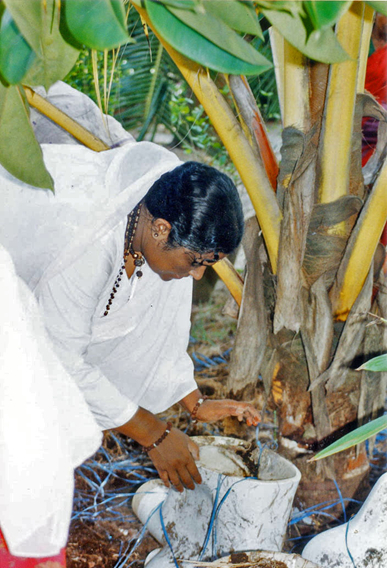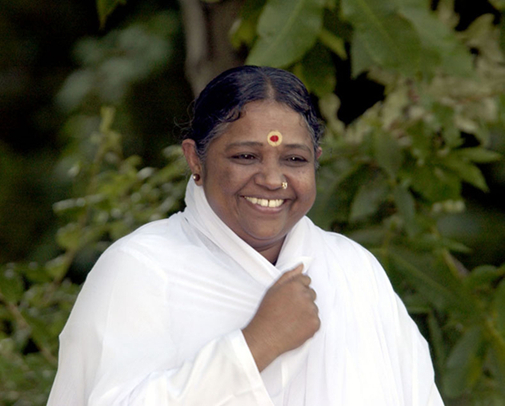
Home > Newsletters > GreenFriends Newsletters
| Home | Source Reduction | Friends of Green Friends | Newsletters |
| Gardening | Resources | What You Can Do | Embracing The Trees |
| Respect For All Life |
| This incident happened in 1984 in Amritapuri - From Awaken Children 6 |
 |
|
A few days ago, one of the residents transplanted a half-grown mango tree from one spot to another on a plot of land which the Ashram had recently bought. He didn’t like the way the mango tree looked where it was, and so, with the help of some other residents, he moved the sapling to a corner of the plot. However, none of them had thought to ask Amma’s permission before transplanting the tree. A day or two after the mango tree had been moved, Amma made an unannounced inspection of the premises. When the brahmacharis saw that Amma was walking in the direction of the new land they looked at each other and started to whisper. They were all afraid because the mango tree had withered away soon after it was moved to a new spot. As soon as Amma reached the new plot, She said, "Something is missing. What is it?" Everyone turned pale; no one spoke. "Shiva! Where is the mango tree!" Amma exclaimed. All remained silent. No one dared to say a word. Amma once again inquired, "What happened to the mango tree? Has someone cut it down?" Finally one Brahmachari stepped forward and in a very feeble voice said, "Amma, Nedumudi moved the tree from here to the other side and we all helped him transplant it." "Where? Where did you plant it?" Amma said in a very worried tone. With the Brahmachari leading the way, Amma and the group walked to the place where the mango tree had been transplanted. Seeing its withered limbs, Amma called out in a heart-broken tone, "Shivane! What did you do to this tree? How could you do this? What a great sin you have committed. Why didn’t you ask me before you moved it? I wouldn’t have allowed you to do such a thing. I can’t bear the sight of this poor, wilted tree." |
| There was much pain and concern in Amma’s words. Her agony was even expressed on Her face. She displayed the feelings and concern of a mother for her hurt child. Amma squatted down on the bare ground with her head down and her hands on her forehead. Those who stood near Amma noticed that she was wiping away tears.
While some wondered why Amma would cry over such a silly matter, others were overwhelmed with admiration for the divine love and compassion that she could show toward all of nature, even toward plants. Moved by Amma’s emotion, some could not control their own tears. Moments passed. After a long interval, Amma spoke. "Children, please do not destroy life like this ever again. Such acts are not fitting for those on the spiritual path. Our goal is to feel life everywhere. We should avoid destruction. We have no right to destroy. We cannot create; therefore, we should not destroy. Only God can create, sustain, and destroy. All three are beyond our capacity. Such great feats fall only under His jurisdiction. Therefore, do not repeat such an act. If you cannot judge things and situations properly on your own, seek the advice of someone knowledgeable or wise. And if they cannot give you proper advice, remain still. It is wiser to do nothing than to act foolishly." "We must remember that everything is sentient, that everything is full of consciousness and life. Everything exists in God. There is no such thing as matter; consciousness alone exists. If we approach all situations with this attitude, destruction becomes impossible for us; the very idea of destruction disappears. Only then can you help and serve others for their benefit and for the betterment of the world." "When Amma talks about the ‘world,’ She is not talking only about human beings. The ‘world’ includes everything - humans and animals, plants and trees - the whole of nature. It is true that human beings are the most visibly evolved creatures, but that doesn’t mean that other forms of life are without feelings. The Vedas and the Upanishads say that everything is pervaded with consciousness." |
| "God dwells in everything. Nowhere is it mentioned that God dwells only in human beings and not in animals or other species of life. He is in the mountains, the rivers, the valleys, the trees. He is in the birds, the clouds, in the stars, the sun and moon, everywhere. God dwells in sarva charaachara, in both the moving and the unmoving. How can a person who has understood this kill and destroy? "
"You may think that humans can speak, walk, act, think and feel, whereas plants cannot. You think that they are lifeless, so you can cut them, destroy them, and use them for your own selfish purposes. However, everything in Nature has a purpose to fulfill. There are no mistakes in creation. Everything in Nature is well-calculated and accurately measured. The proportions are perfect." "Every creature, everything that has been created by God, is special. Think of the miracles of Nature. Camels are blessed with a special bag to store water; the kangaroo has a cradle to carry its baby wherever it goes. And even the most insignificant and seemingly harmful creatures or plants have a specific use. They have a part of their own to play. Amma has heard that spiders keep the insect population in balance; snakes keep the rodent population under control, and even the tiny, one-celled plankton in the ocean serve as food for whales. We cannot know the purpose of everything. Nature is a mystery to us. Therefore, we act foolishly and destroy trees, plants, and animals. Many ayurvedic herbs and plants look to us like useless weeds. Out of ignorance we destroy them. But a knowledgeable ayurvedic physician knows how useful and significant they are." "Man is dependent on Nature for his very existence. Nature is an indispensable part of life on earth. Without Nature no creature, not man or anything else, can live. Therefore, it is one of our foremost duties to lovingly care for all living things. You may feel that destroying a tree or a plant is a lesser wrong than killing a human being." "This concept is wrong. Plants and trees also have emotions and can feel fear. When somebody approaches a tree or plant with an ax or a hacking knife, the plant is afraid; it trembles with fear. You need to have a subtle ear to hear its cries, a subtle eye to see its helplessness, and you need a subtle mind to feel its fear." "You do not see its suffering, but you can feel it if you have a compassionate heart. In order to see the suffering of a plant, your mind’s eye must be open. Unfortunately, you do not see subtle things with your external eyes. Because of this, you destroy a helpless tree or plant." "It has been scientifically proven that not only humans and animals, but plants and trees also have feelings and emotions. They can even express themselves to a certain extent; and if we have the right attitude, we can learn to understand." "Ages ago, the saints and sages of India, having delved deep into the laboratory of their own consciousness, proclaimed that plants and trees also have feelings and that they could express their feelings if one had a loving and compassionate attitude toward them." |
|
|
Interrupting the profound flow of Her words, Amma looked at the mango tree. For some time Amma remained silent, her gaze fixed on the tree. A few moments passed and she slipped into an indrawn mood. While Amma sat with Her eyes shut, tears ran down her cheeks. Perhaps she was feeling compassion for the mango tree. Perhaps her tears were for something else which we can never know. Amma once again went up to the tree. This time she embraced it and kissed its trunk. As if addressing the very life of the tree or some deity that presided over it, she spoke, "My children acted indiscriminately. They are ignorant children, which I consider my own fault. I have not taught them well enough for them to feel the life in all creation. On their behalf, I seek your forgiveness for their ignorant act." Amma once again embraced the tree and kissed it, before walking directly back to the Ashram. The brahmacharis and the residents all felt ashamed. They never would have imagined that someone would apologize to, and seek forgiveness from a tree. Who but a person who beholds life everywhere could do such a thing? Everyone thought that the transplanted mango tree was dead. It had shed all its leaves and its young trunk had gone limp. Then, suddenly after receiving Amma’s attention, the tree slowly began to show signs of life. After a few days, the tree sprouted new leaves, and it was again looking healthy and well. Only then did the residents realize the significance of Amma’s embracing and kissing the tree. In doing so, she must have transmitted new life into it. |
|
 |
Read Listening to the Trees from the Winter 2020 newsletter >>
| Home | Source Reduction | Friends of Green Friends | Newsletters | Resources | What You Can Do | Contact Us |
For more information, e-mail info@greenfriendsna.org |
||||||